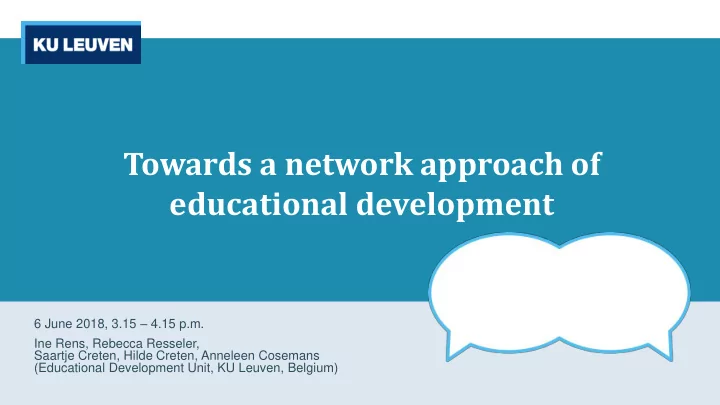

Towards a network approach of educational development 6 June 2018, 3.15 – 4.15 p.m. Ine Rens, Rebecca Resseler, Saartje Creten, Hilde Creten, Anneleen Cosemans (Educational Development Unit, KU Leuven, Belgium)
Your ‘AS IS’ -situation versus your ‘TO BE’ -situation : fit or mismatch ? Educational Development Unit
EDU? A team of educational developers professors & teacher assistants with their didactical teams including local educational developers, program directors, vice deans of education, … Educational Development Unit
14 campuses in 10 cities across Flanders, Belgium 16 faculties organised into 3 science groups (Humanities & Social Sciences - Biomedical Sciences - Science, Engineering & Technology): 78 Bachelor’s programs, 205 Master’s programs, 44 advanced Master’s programs Total number of students: 57.851 Total staff members university: 12.008 Senior Academic Staff: 1.762 | Junior Academic and Scientific Staff: 6.368 Educational Development Unit (EDU): 10 FTE Educational Development Unit
EDU? peer learning Course design Yearly training offer learning on the job Online & blended modules Curriculum in context and advisory material development flexible Customised, contextualised learning trajectories in Educational technology faculties and programmes active and innovation Individual advising, coaching, evidence based and training Vision on education integrated support
Ideally … How are you situated in your institution? • Who would ask you questions? Central Decentral One campus Multi-campus • What would their questions be about? Focus on Broad approach teaching & (including quality learning assurance, student • What role do they expect from you? administration ..) Educational Development Unit
When was the question received? What was the occasion for the question (if there was a specific one)? Who asked the question, what is his/her job and from which faculty/unit does he/she come? Which team member received the question? Description of the question Which team member did the follow-up of the What was the question? question about ? What service was given? Contracting How much time was spent to the question? Educational Development Unit
Which questions are, for you, ‘frequently asked’ ones?
curriculum developer educational technologist consultant change agent broker Which role is addressed in your FAQs? partner expert policy maker advocate educational researcher
Which role is addressed in the question? Researcher Instructional Change agent 1% designer 1% 1% • Mostly ‘small’ (< 2h) and Broker ‘medium’ (0,5 – 2 days) 7% questions (in total: 2 FTE) Educational Curriculum technologist designer 27% 9% • Questions coming from local developers (25%) Undecided and teachers (25%) . 11% Others: teaching assistants (12%), colleagues from other units (12%), … Course designer Professional 19% developer 24% N = 320 (September 2017 – May 2018) Educational Development Unit
EXPERT ON Course Curriculum Instructional Educational Prof. Resear Change - Broker Design Design Design Technology Dev. cher Agent Local EDs 15 13 1 10 16 16 10 1 Teachers 23 2 2 28 11 12 2 1 Teaching 5 9 5 19 1 1 assistants Colleagues 4 1 12 9 11 4 other units Vice dean / program 3 4 1 2 3 1 1 coordinator Educational Development Unit
By whom should these roles (addressed by others) be carried out? wished-for or expected Your ‘AS IS’ -situation Should you develop versus new roles or new domains of expertise? your ‘TO BE’ -situation : fit or mismatch ? Does this mismatch call for changes in the organisational How did you realise this fit? structure of your unit/institution?
Agile working Squad SquadSquadSquadSquad Educational Development Unit
Leuven Learning Lab A networked interface structure between all actors in our multi-campus organisation Uniting all services that are formed through direct contact with teaching staff and students; combining didactic, technological, technical and media expertise Catalyst for the necessary innovation processes Educational Development Unit
Round-up & end
Thank you! doo@kuleuven.be www.kuleuven.be/doo @kuleuven_doo
References • Debowski, S. (2014). From agents of change to partners in arms: The emerging academic developer role. International Journal for Academic Development, 19 (1), 50-56. • Fraser, K., Gosling, D., & Sorcinelli, M. D. (2010). Conceptualizing evolving models of educational development. New Directions for Teaching and Learning, 122, 49-58. • Gibbs, G. (2013). Reflections on the changing nature of educational development. International Journal for Academic Development, 18 (1), 4-14. • Knapper, C. (2016). Does educational development matter? International Journal for Academic Development, 21 (2), 105-115. • Martensson, K., & Roxa, T. (2016). Working with networks, microcultures and communities. In D. Baume, & C. Popovic (Eds.), Advancing practice in academic development (pp. 174-187). • Sugrue, C, Englund, T., Solbrekke T. D., & Fossland, T. (2017). Trends in the practices of academic developers: trajectories of higher education? Studies in Higher Education, 1-18 . • Van Note Chism, N. (1998). The role of educational developers in institutional change: from the basement office to the front office. To Improve the Academy, 401. Educational Development Unit
Recommend
More recommend